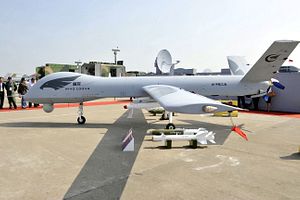State-owned Aviation Industry Corporation of China (AVIC) and Pakistan Aeronautical Complex (PAC) have agreed to co-produce 48 Chinese-designed next-generation medium-altitude long-endurance and strike-capable Wing Loong II unnamed aerial vehicles (UAV), the Pakistan Air Force (PAF) revealed in a social media post on October 6.
Neither AVIC nor PAC have so far publicly confirmed the inking of a sales contract. It is also unclear when the purported deal was signed or how much it is worth. Additionally, there is no information when the 48 UAVs are slated for delivery. Pakistan has been mulling the purchase of additional Chinese-made UAVs for a number of years. (The PAF is currently operating four China-made Caihong 4 (CH-4), or Rainbow 4, UAVs.)
The Wing Loong II UAV successfully completed its first maiden flight on February 27, 2017. As I reported in March 2017:
China’s latest strike-capable drone has been designed and developed by the Chengdu Aircraft Design and Research Institute, a subsidiary of AVIC. With an overall length of 11 meters, a wingspan of 20.5 meters, and a height of 4.1 meters, the Wing Loong II UAV was first publicly revealed at the Airshow China 2016 in November 2016. At the airshow, China Aerospace Science and Technology Corporation’s (CASC) for the first time publicly displayed a prototype of its latest and most capable attack and reconnaissance UAV, the Caihong 5 (CH-5), or Rainbow 5.
The Wing Loong II is an upgraded variant of the Wing Loong UAV first introduced into service with the People’s Liberation Army Air Force in 2008. An export version of the drone has been sold to a number of international customers including Egypt, Saudi Arabia, the United Arab Emirates, Nigeria, Uzbekistan and Kazakhstan. (…) In terms of size and payload, the original Wing Loong combat drone is comparable to the General Atomics MQ-1 Predator, which is slated to be retired by the U.S. Air Force by the end of the year.
Additionally, I noted:
The Wing Loong II UAV can carry a number of different missiles and bombs including Lan Jian 7 (Blue Arrow 7) laser-guided air-to-surface missiles, TG100 laser/INS/GPS-guided bombs, and the AR-1/HJ-10 anti-tank missile — the Chinese equivalent to the American-made Hellfire missile. Overall, the Wing Loong II can purportedly carry a payload of up to 400 kilograms. The UAV can fly for about 20 hours with a maximum speed of 370 kilometers per hour. The Wing Loong II has an operational radius of 1,500 kilometers.
The UAV has been primarily developed for export and has been marketed by Chinese developers as a cheaper alternative to the MQ-1 Predator. The per-unit price is estimated at around $1-2 million in comparison to, for example, the MQ-9 Reaper’s $30 million.
In March 2017, China announced that Saudi Arabia is interested in purchasing up to 300 Wing Loong II UAVs. As I reported in January 2018, the first export customer of the Wing Loong II appears to be the United Arab Emirates.
































